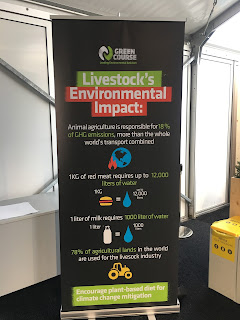Sustainable Food Sourcing and Plant Based Diets
One of the most overlooked topics in climate change is sustainable foods. All humans need food to survive, but so few people think about where it comes from. Sourcing of the fruits, vegetables, meats and starches that we survive off of seem to only come from the grocery store shelves that we choose them from. But, as climate keep changing, people start to become affected by the loss of diversity in their diets.
Bananas, potatoes, and rice are staples in many people's diets. At the sustainable agriculture panel I attended, there were native Peruvians speaking about how they were being forced to raise their crops higher up on the mountainside due to arid land and pollution. Banana populations are slowly depleting throughout the tropics and rice farms are being destroyed by natural disasters. These plants are vital to many countries' markets and without them the natives as well as the countries' economies could not survive.
(Sustainable nutrition solutions from sustainable agriculture panel)
A major carbon emitter is the livestock industry. The Paris Agreement never explicitly states anything about the livestock industry yet without a change, the world will exceed the two degree mark long before due to the livestock industry. Raising and slaughtering animals wastes plants and water as well as producing copious amounts of carbon dioxide. In a plant-based protein panel I attended, a representative from a vegetarian organization stated that over 60% of the United States emissions comes from animal production.
(Al Gore, an avid vegan and climate activist)
Sustainable agriculture and local and ethical food sourcing is vital to the UNFCCC 1.5 degree promise and seems to go widely overlooked. Saving the planet starts with you and what’s on your plate.


Bananas, potatoes, and rice are staples in many people's diets. At the sustainable agriculture panel I attended, there were native Peruvians speaking about how they were being forced to raise their crops higher up on the mountainside due to arid land and pollution. Banana populations are slowly depleting throughout the tropics and rice farms are being destroyed by natural disasters. These plants are vital to many countries' markets and without them the natives as well as the countries' economies could not survive.
(Sustainable nutrition solutions from sustainable agriculture panel)
A major carbon emitter is the livestock industry. The Paris Agreement never explicitly states anything about the livestock industry yet without a change, the world will exceed the two degree mark long before due to the livestock industry. Raising and slaughtering animals wastes plants and water as well as producing copious amounts of carbon dioxide. In a plant-based protein panel I attended, a representative from a vegetarian organization stated that over 60% of the United States emissions comes from animal production.
(Al Gore, an avid vegan and climate activist)
Sustainable agriculture and local and ethical food sourcing is vital to the UNFCCC 1.5 degree promise and seems to go widely overlooked. Saving the planet starts with you and what’s on your plate.


Comments
Post a Comment
Thanks for the comment. We'll get it posted ASAP. Remember that we are in time zone UTC +1, seven hours ahead of Minnesota.